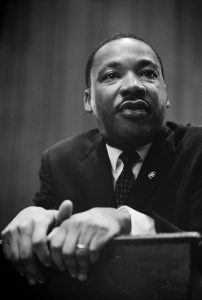Catalyst Question
Who is the most famous person you’ve met? Share the story of how it happened.
God Among Us
Luke 6:17-26 recalls a time when Jesus taught crowds about blessings and woes. It’s a striking teaching because, in it, Jesus challenged his listeners’ standard way of thinking. Are you experiencing things that people typically consider negative, like hunger, poverty, sadness, and social rejection? Soon you will experience God’s blessing. Are you experiencing wealth, popularity, satisfaction, or laughter in this current culture? Then you will be troubled by the new world that is coming with God’s reign. Not right at this moment, but change is on its way.
What’s even more striking about this is the staging.
Jesus “came down with them and stood on a level place.” In other words, Jesus taught from within the crowd rather than a place of privilege. The Creator of the Universe stood among, rather than above, its creatures. The one named Emmanuel, God with us, chose once again to be with the people in the midst of their needs.
A t this halfway point of Black History Month, it’s good to remember that the leaders of the Civil Rights Movement also chose to be among the people they led and taught. Martin Luther King, Jr. didn’t just speak on Washington Mall, but also in Southern country churches. John Lewis didn’t just lead from Congress but from joined in demonstrations on public busses. Ella Baker organized at the local level to boost voter registration. So many others, from Fannie Lou Hamer to Bayard Rustin to Andrew Young and more, worked with people at their own level. These leaders reflected Christ not only because they sought the equity promised by Jesus in this Sermon on the Plain. They reflected Christ because they followed his lead and led from among the people. With that leadership model, they followed Jesus in changing the world.
t this halfway point of Black History Month, it’s good to remember that the leaders of the Civil Rights Movement also chose to be among the people they led and taught. Martin Luther King, Jr. didn’t just speak on Washington Mall, but also in Southern country churches. John Lewis didn’t just lead from Congress but from joined in demonstrations on public busses. Ella Baker organized at the local level to boost voter registration. So many others, from Fannie Lou Hamer to Bayard Rustin to Andrew Young and more, worked with people at their own level. These leaders reflected Christ not only because they sought the equity promised by Jesus in this Sermon on the Plain. They reflected Christ because they followed his lead and led from among the people. With that leadership model, they followed Jesus in changing the world.
Christ-like leaders don’t lord their power over subjects or make unilateral decisions without care for the impacts on the poorest among us. Christ-like leaders live life among the people and lead in ways that prepare us all for the new world of God’s reign where all share in God’s blessings. Let us look to Christ, then go and do likewise.
Ask Yourself
Name three leaders who lead like Jesus in this story and three who don’t. Who has the most power in society? Why do you think that is?
Ask a Friend
Who is a leader that you follow? How do they remind you of Jesus, if at all?




